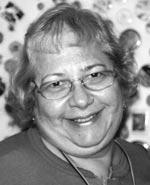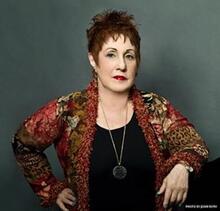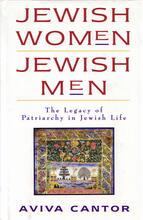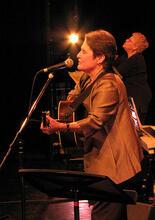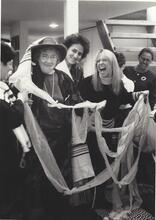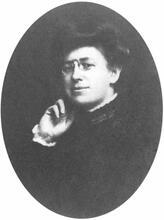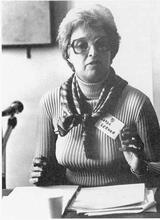Aviva Cantor
Journalist and lecturer Aviva Cantor is the author of the theoretical work Jewish Women, Jewish Men: The Legacy of Patriarchy in Jewish Life, a passionately analytical synthesis of feminism, Judaism, Zionism, Socialism, animal rights and environmentalism, as well as of the landmark The Egalitarian Hagada. Cantor worked as a reporter for the London Jewish Chronicle before becoming founding editor of the Jewish Liberation Journal. She helped plan the first National Jewish Women’s Conference in 1973, where she began discussing the idea of a Jewish feminist magazine. Three years later she cofounded Lilith, the independent Jewish feminist magazine, and became one of its editors. She also served for over 25 years as Vice President of CHAI: Concern for Helping Animals in Israel.
The great synthesizer, a woman of immense enthusiasms and passionate disputation, Aviva Cantor remains a devoted Trekkie (as in Star Trek). She is committed to the Jewish values on which, in her words, “the fundamental vision of ST is based: pursuit of peace, cooperation, ending violence and oppression, respect for differences -- and love for the Planet and its creatures.”
Family and Education
Aviva Cantor was born in the East Bronx, New York, on February 12, 1940. She describes her parents as “deeply committed to the Jewish tradition and culture but not strictly observant.” Her father, Joseph Cantor (1897–1961), owned a corner drugstore. Born in a (Yiddish) Small-town Jewish community in Eastern Europe.shtetl in what is now Belarus, he spoke seven languages and studied at the Volozhin Yeshiva, which Cantor describes as “the Harvard of the Jewish world.” After immigrating to the United States in the 1920s, he graduated from the Brooklyn College of Pharmacy. Her mother, Naomi Friedman Cantor (ca. 1911-1966), born in “Russian Poland” (now part of Ukraine), grew up as an orphan in Toronto then moved to New York, where she met and married Joseph. Naomi was an “economic energizer,” working as a beautician, sales clerk, and homemaker.
Cantor attended the Modern Orthodox Ramaz School in Manhattan from fourth grade through high school. There she experienced class conflict for the first time, as a child from a “middle-middle-class” family in a working-class neighborhood now in the midst of an upper-middle-class student body. However, she wrote school plays, was beloved by her teachers, and was the class valedictorian. She spent summers as a camper and then counselor at Massad, a Hebrew-speaking Zionist camp.
Cantor’s father was a life-long ardent Zionist who had been unable to obtain a certificate from the British to settle in Mandatory Palestine. Cantor’s own dream was to study at the Hebrew University of Jerusalem, where she spent two years, following which she graduated from Barnard College in 1961 with a major in history.
Journalism Career
After graduating from college, Cantor worked for a year as an editorial assistant at the United Nations, going on to receive her M.S. from the Columbia Graduate School of Journalism in 1963. She then worked as a reporter for the American Bureau of the London Jewish Chronicle (LJC), where she broke a major story about an anti-Semitic Soviet book that had international repercussions. She subsequently worked as editor of Israel Horizons and of the Newsletter of the Givat Haviva Educational Foundation.
In 1966 Cantor married Murray Zuckoff (1925-2004), a journalist and author of Socialist theoretical papers, who later became the editor of the Jewish Telegraphic Agency and a writing teacher at Lehman College.
Reporting for the LJC from New York, Cantor covered the initial activities of what became the Jewish movement in the late 1960s through mid-1970s. The loose coalition of scores of self-organized groups on and off camps was involved in efforts to reform the Jewish community’s political and cultural life, especially in the area of Jewish education, and to advance Israeli-Palestinian peace. Its “roof organization,” affiliated with the World Union of Jewish Studies, was the North American Jewish Students Network with its Jewish Student Press Service.
Not just reporting on the movement, Cantor was a founding member of the Jewish Liberation Project, a Socialist Zionist organization, founding editor of its Jewish Liberation Journal, and a member of the First Steering Committee of the North American Jewish Student Network and the Governing Board of the Jewish Student Press-Service. She cherishes the memory of the 1970 takeover by Jewish movement activists of the offices of the Jewish Federation of Greater New York, with demands for substantial funding for Jewish education and youth work. Her discovery of the Federation’s secret allocations budget, which the Jewish Liberation Journal subsequently published, was a journalistic coup.
Cantor was a reporter on the JTA staff in 1985 and 1986 and worked on freelance assignments for the agency for over ten years, writing series on Jewish communities in Argentina, Cuba, Central Europe, Kenya, and Vienna. She interviewed Carl Sagan, Gerhard Riegner, David Wyman, and Yehuda Bauer, among others, for JTA. From 1999 to 2001 she was the news writer for the English section of the Algemeiner Journal, a Yiddish-English weekly, and wrote a regular column for the Jewish Voice of Greater Monmouth County (New Jersey).
Jewish Feminism
Cantor’s activities in the early days of the Jewish feminist movement included helping plan and speaking at the First National Jewish Women’s Conference in February 1973. At the conference, she and other women formed a collective to establish Lilith magazine, originally Cantor’s idea, which came to fruition in 1976. The first issue featured Cantor’s ground-breaking piece “The Lilith Question”; in this essay, she analyzed a medieval Jewish legend of an independent female advocate of gender equality and why and how she was later slandered. For the next decade, Cantor was a Lilith editor.
Cantor continued to write and edit and serves as a member of the Advisory Board of Remember the Women Institute, which uses literature, drama, exhibits, and archival work to bring to light the work of women during the Holocaust. She has lectured on feminism and other issues of Jewish concern throughout North America, as well as in Israel, London, and Rome. She was active on behalf of Biafra as Vice President of the Committee for Biafran Artists and Writers and against the genocide in Bosnia.
In 1995, Cantor published Jewish Women/Jewish Men: The Legacy of Patriarchy in Jewish Life. Ranging over 3,500 years of history, this ground-breaking work explored how and why the woman’s role became that of “altruistic-assertive enabler,” allowed a certain expressive leeway and vocational responsibility because of the “national emergency” of the Exile, and subsequently changed in Israel and North America.
Cantor also wrote and self-published The Egalitarian Hagada, an alternative Passover ceremony in non-sexist English that interweaves traditional readings and songs with modern poetry and prose to connect the Exodus with today’s Jewish struggles for freedom.
Animal Rights
An animal lover from childhood and a vegetarian, Cantor has long been involved in the animal protection movement. Her groundbreaking feminist article on animal rights, "The Club, the Yoke and the Leash,” appeared in Ms. magazine in 1983. She served for over 25 years as Vice President of CHAI: Concern for Helping Animals in Israel (founded in 1984), which provides veterinary supplies to the country’s SPCAs, runs conferences, organizes humane education, and does advocacy and direct rescue work. Cantor also wrote a Humane Education curriculum for elementary school pupils using Jewish sources. She is currently completing a book on the Jewish-animal bond.
Following her husband’s death, Cantor moved from Manhattan’s Upper West Side to Lower Manhattan with her rescue cat, Ginger. The apartment, a testament to her wide-ranging passions, is replete with stuffed animals; shelves exploding with books and cat tchotchkes; artwork; and wildlife calendars. A wall canvas is festooned with decades of political action buttons. A few highlights: “Cat Lovers Against the Bomb,” “No Donation Without Representation,” “Write Women Back Into History,” and the Star Trek Vulcan Delegation button “United Federation of Planets Delegate.” On her bulletin board is the quote that expresses a lifetime of political struggle: the concluding words of Warsaw Ghetto Uprising leader Mordechai Anilewicz’s 1941 address to his students: “Whatever may happen to you, always remember: Don’t adjust! Revolt Against the Reality!”
Selected Works
Books
Jewish Women/Jewish Men: The Legacy of Patriarchy in Jewish Life. San Francisco: Harper San Francisco, 1995.
The Egalitarian Hagada. New York, 1991, 1992, 1996 (out of print).
The Jewish Woman, 1900–1985: A Bibliography. New York: Biblio Press, 1986, 1987.
Articles
Animal Rights
“Animals in Jewish Law, Lore and Literature.” In The Third Jewish Catalog/ Philadelphia: Jewish Publication Society of America,1980.
“Noah’s Ark: The First Floating Wildlife Reserve.” In Jewish Almanac, edited by Richard Siegel and Carl Rheins. New York: Bantam Books, 1980.
“The Club, the Yoke and the Leash: What We Can Learn From Patriarchy’s Treatment of Animals.” Ms., August 1983.
“Elephants and the Jewish Question.” Jewish Currents, July 2013.
“Scapegoats: Jews, Animals and Oppression.” La Rassegna Mensil d’Israel (Magazine of the Italian Jewish Community), Rome, 2018. (in English)
Jewish Issues: magazines
“The Lilith Question.” Reprint of the author’s first analysis of the Lilith mythology, Lilith 1 (Fall 1976).
“TV’s ‘Holocaust’: The Selling of Assimilation.” Lilith, 5 (1978).
“Feminism Is Good for Women—and Men, Too.” Present Tense (Spring 1984).
“My Children Are Disappeared—A Jewish Mother’s Struggle Against Argentine Fascists.” Lilith 15 (Summer 1986).
“She Fought Back: Interview with Vilna Partisan Vitke Kempner.” Lilith (Spring 1987).
“Therapy and Jewish Women.” Na’amat Woman (January-February 1993).
“Halcyon Days: The Sixties Movement for Jewish Regeneration.” Culturefront (Winter 1997).
“Raphael Lemkin and the Genocide Convention.” Naamat Woman (Summer 2010).
Jewish issues: Jewish Voice of Greater Monmouth County, NJ
“Is Smashing the Glass Ceiling for Women Professionals in Jewish Organizations a Priority When the Walls Are Collapsing and the Foundations Sinking?” (January 2002).
“Lilith Liveth” (August 1999).
“Maccabees and Martyrs” (November 1999).
“My Son, the Suicide Bomber” (October 2001).
“Day Care: The Perils of Relying on the Kindness of Strangers” (June 1999)
“The Uses and Dangers of Holocaust Denial” (May 2000).
“Whatever Happened to the Zionist Dream?” (July 2000).
“Can American Jews and Israel Return to ‘We Are One’?” (July 2001).
“Genetic Engineering and the ‘Kibbutz Ecosystem’” (September 2002).
“Unveiling the Secret of the Book of Esther” (February 2002).
“Why Jews Favored U.S. Intervention in Kosovo,1999 and Biafra,1968” (March 1999).
“A Tribute to Jan Karski” (August 2000).
“Forsaken—the ‘Jewish Amadou Diallo’ (the Gary/Gideon Busch Case)” (March 2000).
Memoirs
“Goodbye, Longfellow Avenue.” Algemeiner Journal, April 19, 2000.
“The Phantom Child.” In The Woman Who Lost Her Names: Selected Writings by American Jewish Women, edited by Julia Wolf Mazow. New York: Harper & Row, 1980.
“Kaddish for a Kitten.” In Journal ’49 (2013).
“Losing My First Best Friend,” New York: 2008 (unpublished).
Fiction: Children’s Literature
Tamar’s Cat: A Story of the Exodus. Book manuscript awarded first prize in the 1991 Sydney Taylor Competition of the Association of Jewish Libraries. An enslaved Jewish girl schemes to take her cat with her when the Jews leave Egypt during the Exodus (unpublished).
“Elektra the Maccabee,” co-authored with Elizabeth Levy. Short story of how a young girl joins the Maccabean resistance, Lilith (Winter 1976-’77).
Fiction
“Suicide Hill.” Journal ’49, 2011.
“Peninah’s Story” Retelling of the Penina-Elkanah-Hannah triangle, 2013 (unpublished).
“Moses’ Memoirs of the Desert Trek,” one act play, 2008 (unpublished).


